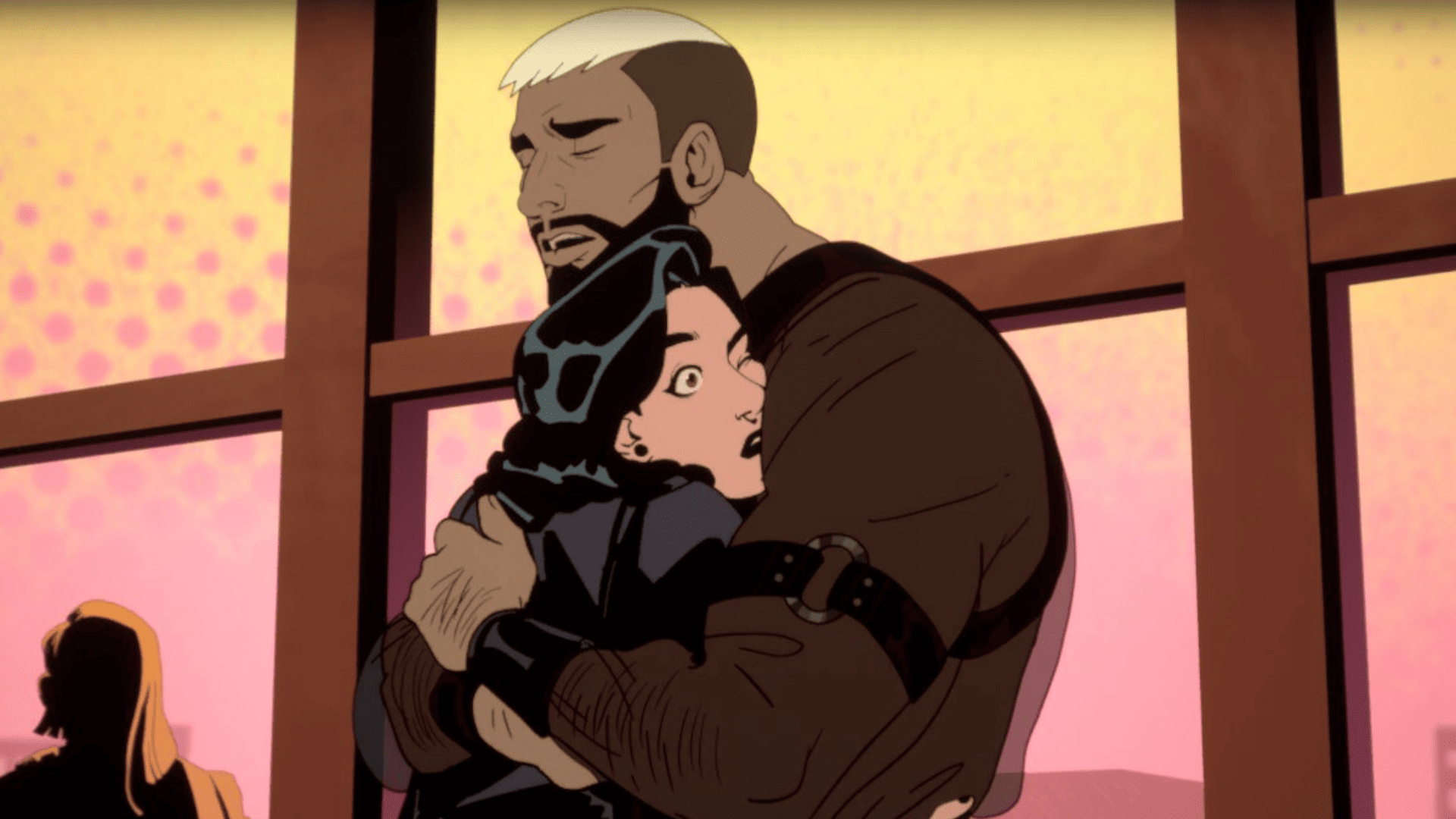
Stray Gods portrayal of Eros understands the weight of a caregiver
Change is one of the most difficult things to embrace. Sometimes you’ll do anything to get away from it; become a whole other person, or deny that it’s ever happening in the first place. Turning your back on it entirely. This rigid refusal to embrace change fuels the underlying narrative of Stray Gods, an RPG that also just so happens to be a musical.
Playing as Grace, a mid-20s college drop-out who is thrown into a murder mystery that involves the Greek pantheon after the death of a Muse, players interact with the various denizens of Greek mythology throughout this adventure, and boy if they don’t have their own list of issues. Each one is worth listening to and empathizing with, such as the often-villainized Medusa, the injustice that follows Persephone’s kidnapping, and even Pan, who is often treated as a scoundrel that isn’t worth trusting.
Yet for me, one character in Stray Gods stood out the most: Eros, voiced by Abubakar Salim.
Eros, the God of Sex, is first seen during Grace’s arrival at Persephone’s nightclub, Underworld. You may look at him and think that this is certainly a man who knows how to have a good time, but it’s easy to catch on that he’s got a lot on his mind. I was curious about Eros from the get-go, especially with how Salim’s voice conveyed an easy-going but tortured soul. Depending on your choices, you can get an idea on what’s hurting him, but there’s no real definite answer.
Until The Ritual. Once Grace heads to Aphrodite’s party, we discover the real reason Eros is so subdued: he has to watch his mother Aphrodite die once again. First off, context: Ares, the God of War, is confirmed to have stoked the flames of a war that’s heavily implied to be World War 2. During this time the remnants of the Greek pantheon have mostly ignored what happened, not wanting to get involved. Even so, Aphrodite is captured, thanks to Ares telling the Nazis about the rest of his family. She’s tortured and is only freed after her husband, Hephaestus, agrees to go with the Allies and help build them a weapon (which is heavily implied to be the atomic bomb) that’ll ‘stop the war’ for good.

All in all, it’s an unpleasant story, and it has left Aphrodite traumatized. To free herself from reliving it, she passes on her soul (known as an eidolon) to people she thinks are worthy to carry her name, thereby robbing her of memories of her past life until, eventually, they come back and she has to repeat the process all over again. She’s been doing this for so long, and the only one who is there for her through it all is Eros. Hence why he is so gloomy when Grace first meets him.
It’s hard not to feel compassion for Aphrodite. Yet despite my complex, and often uncomfortable, feelings Stray Gods conjured within me, I couldn’t help but feel a certain kinship to Eros and his struggle too. I’ve been a caregiver for the majority of my life and after a life-shattering event such as what Aphrodite went through, I can’t help but understand just how traumatizing it is for both the person who needs to be cared for, and the person that takes on that level of care. It doesn’t help that, as explained by Eros himself, the level of care shown to Aphrodite is at a bare minimum.
“I take care of Aphrodite. Ever since we came to the New World. I’m with her. Every. Single. Day,” he tells Grace. He’s there for the nightmares, the times when she wakes up and doesn’t realize the war is over, and the times when it’s so difficult, so tiring to continue, but he does so anyway. This isn’t a slight against Aphrodite, whose haunting melancholy is portrayed beautifully by Merle Dandridge, but as someone who has been caring since a young age I quickly became personally invested in Eros’ side of things.
Often when it comes to portraying caregivers in media, they’re portrayed as utterly miserable and haunted by the decision to take on someone to care in the first place. That isn’t the case for Eros, who is understandably traumatized by his mother effectively wiping away her memories every couple of years. His lack of cheer isn’t due to him wanting to be away from his mother, but how caring for her has often left him isolated in a way so few, outside of other caregivers anyway, can understand.

As Eros explains to Grace, only himself and Venus, a young woman who Aphrodite has lined up to pass on her eidolon, have been there for Aphrodite over the decades since her torment. None of the other gods or goddesses, outside of turning up for her ‘funeral’, has seemingly reached out to help him with care, leaving him utterly exhausted. It’s clear to see that, despite the ties that connect them, whoever’s left of the Greek pantheon isn’t interested in helping out. Not even Athena, a maternal figure for all of the pantheons left, shows any interest in trying to help Eros or Aphrodite — far too preoccupied with the daunting task of making sure they continue to thrive and remain hidden in the modern world.
With no support from outside of their bubble, it’s obvious that their familial relationship is broken and all are adrift. Summerfall Studio’s portrayal of a shattered family, and how a lack of a support system can be detrimental to not just the person in need of care, but the caregiver too, truly spoke to my experience. The overwhelming pressure put on Eros is undeniable, and yet even when Grace expresses that he should perhaps move on from caring, Eros’ refusal calls back to the central theme of Stray Gods: fear of change. After caring for so long, what would it be like for Eros to put himself first? He doesn’t even consider it an option. And neither have I.
Yet change comes anyway in the form of Grace. Ultimately, it’s up to the player whether they can encourage Aphrodite to get up and fight away her demons, or grant her the peace she desires. Eros, oddly silent throughout the majority of the song, finds his voice during the final decision, pleading with his mother not to avert her eyes away from the emotional battlefield she leaves behind each time she does this ritual.
At first, I was disappointed that Stray Gods didn’t make it so it was Eros who ultimately convinces Aphrodite to live. Now though, I realize doing so would have betrayed the spirit of the real crux of the problem: Eros and Aphrodite being utterly alone and trapped in their own personal hell with nobody else reaching out to help them; Aphrodite with what happened to her, and Eros having to watch her relive it over, and over, again.
In conclusion? It’s only when Grace embraces Aphrodite and Eros both that they come out of the other side. A painful realization maybe, but a fulfilling one that made Eros’ journey stick with me long after Stray Gods’ closing act.






